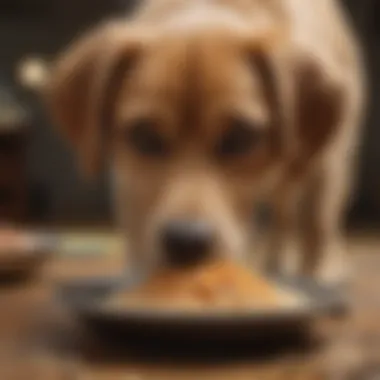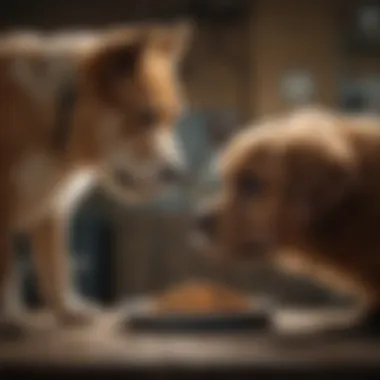Essential Dietary Guidelines for Dogs with Diarrhea


Intro
When a dog experiences runny poop, it can be concerning for pet owners. Understanding what to feed a dog with diarrhea is crucial in addressing this common health issue. This guide delves into various dietary options tailored for dogs suffering from gastrointestinal upset. By understanding the potential causes and appropriate feeding strategies, pet owners can provide relief and contribute to their dog's overall health.
Understanding Your Pet
A dog's breed and temperament play significant roles in its dietary needs. Some breeds have more sensitive stomachs, making them prone to digestive issues. Recognizing these traits helps in making informed feeding choices.
Breed Traits
Each dog breed is unique. For instance, smaller breeds may have faster metabolisms, which can affect their digestion. Larger breeds might require more protein in their diets. Knowing breed-specific needs can help pet owners select the right food.
Common Temperaments
Some dogs may be more anxious or reactive, which can affect their eating habits. Stress can lead to gastrointestinal issues. Identifying behavioral quirks can guide owners in managing feeding routines and environments, promoting calm during meal times.
Special Needs
Dogs with specific health concerns, like food allergies, may have unique dietary restrictions. It’s essential to consult with a veterinarian when addressing these special needs, especially when adjusting their diet due to diarrhea.
Nutrition and Feeding Guidelines
Adjusting a dog’s diet during episodes of diarrhea is vital. Certain foods can help firm up stools and alleviate discomfort.
- Bland Diet: Introducing simple, bland foods such as boiled chicken and white rice can help settle the stomach. Avoid adding seasonings or fats to keep it gentle on their digestive system.
- Hydration: Ensuring your dog stays hydrated is crucial, as diarrhea can lead to dehydration. Fresh water should always be available. Sometimes, an electrolyte solution made for pets can be beneficial.
- Probiotics: Adding probiotics can promote a healthy gut flora, helping restore balance to the digestive system.
Health and Wellness
Regular check-ups with a veterinarian are essential for maintaining a dog's health. Monitoring for signs of worsening symptoms is critical. If diarrhea persists for more than a day or two, seeking professional advice is recommended.
The End
Understanding Canine Diarrhea
Diarrhea in dogs can be a troubling condition for both the pet and its owner. Understanding the types of diarrhea and its causes is essential for determining appropriate dietary adjustments. Proper knowledge helps in effective management and contributes to overall canine health. A dog's digestive system is sensitive, and various factors can lead to gastrointestinal upset. This section covers key dimensions of diarrhea, providing insight to alleviate your dog's discomfort.
Types of Diarrhea
Acute Diarrhea
Acute diarrhea is typically a sudden onset of loose stool. This type can be caused by dietary changes, stress, or infections. The rapid development of symptoms helps in recognizing the condition promptly, which is useful for effective intervention. Because it is often self-limiting, acute diarrhea frequently resolves without extensive treatment. However, understanding its specifics allows pet owners to monitor for dehydration and ongoing health issues.
Chronic Diarrhea
Chronic diarrhea, in contrast, persists for longer than two weeks. This condition often indicates underlying health issues or persistent infections. Recognizing chronic diarrhea is important because it seldom resolves on its own. Chronic forms can severely affect nutrient absorption and overall well-being. Awareness about this type encourages prompt veterinary assessment to determine root causes. This can lead to tailored dietary solutions relevant to the dog’s needs.
Distinguishing Symptoms
Identifying distinguishing symptoms in dogs with diarrhea is vital. Symptoms may include frequency of defecation, urgency, or additional signs of discomfort. Owners should note if there are any accompanying symptoms like vomiting or lethargy. Accurate symptom tracking aids in communication with veterinary professionals, leading to a better understanding of the dog's condition. This knowledge allows for quicker action and can significantly improve recovery outcomes.
Common Causes of Runny Poop
Dietary Indiscretion
Dietary indiscretion refers to a dog's tendency to eat unsuitable food items, leading to gastrointestinal upset. This can include scavenging or consuming items not part of their regular diet. It is a common reason for acute diarrhea. Pet owners should be cautious about what their pets have access to, as this can prevent potential health issues. Monitoring feeding habits and maintaining a consistent diet can significantly help in avoiding this issue.
Food Allergies


Food allergies can play a crucial role in causing runny poop. They occur when a dog's immune system reacts negatively to specific proteins or ingredients. Identifying initiating allergens often requires an elimination diet followed by reintroduction of potential triggers. This meticulous approach can help in determining the specific problematic food. Knowledge about food allergies allows for informed dietary choices, enhancing a dog's quality of life.
Infections and Parasites
Infections and parasites are significant contributors to canine diarrhea. Bacterial infections, viral diseases, and parasites like Giardia can all lead to gastrointestinal distress. Understanding potential risks, including how dogs acquire these infections, is vital for prevention. Regular health checks and proper hygiene can reduce incidences of infections. This awareness fosters a proactive approach in maintaining a dog's health and well-being.
Underlying Health Issues
Underlying health issues can be a reason for recurring diarrhea. Conditions such as pancreatitis, inflammatory bowel disease, or cancer can cause chronic gastrointestinal symptoms. A thorough veterinary examination can uncover these problems. Recognizing this possibility is essential for pet owners as it can lead to tailored treatment and dietary strategies addressing specific health concerns. This vigilance supports long-term health management.
The Role of Diet in Gastrointestinal Health
Diet plays a critical role in maintaining the gastrointestinal health of dogs. What they consume can significantly influence not only their digestion but also their overall well-being. Proper nutrition provides the necessary balance that supports a healthy gut, especially when addressing issues like runny poop. A well-structured diet can mitigate gastrointestinal distress and help restore harmony in their digestive system.
Importance of Nutrition
Impact on Digestion
The impact of nutrition on digestion is profound. It directly affects how well a dog's gastrointestinal system functions. High-quality ingredients facilitate smoother digestion, while poor choices can lead to complications like diarrhea. The key characteristic of this aspect is that nutritional value enhances digestive efficiency. Foods rich in digestible fibers and nutrients encourage a stable gut environment. Therefore, these options stand out as beneficial for addressing diarrhea in dogs.
A unique feature of focusing on digestion is the selection of easily digestible carbohydrates and lean proteins. These choices minimize the load on the digestive system, allowing for quicker recovery from gastrointestinal upset. However, it may be challenging to determine which foods are ideal, requiring careful observation and adjustment.
Nutrient Absorption
Nutrient absorption also plays an essential part in dietary considerations for dogs with diarrhea. This process determines how effectively a dog can utilize the nutrients from food. The key point is that proper absorption can prevent deficiencies that often accompany digestive issues. Foods that are rich in vitamins and minerals bolster overall health, making nutrient absorption a crucial focus for this article.
From a practical standpoint, incorporating foods that support gut health enhances nutrient uptake. Probiotics and specific fibers present additional advantages, as they promote a healthy flora balance, which is vital for absorption efficiency. Nonetheless, some more complex foods may hinder absorption due to their composition, making it essential to choose based on the dog's current health condition.
Choosing the Right Food
Selecting the proper food for a dog suffering from runny poop can dictate recovery. There are important considerations when evaluating whether to go with commercial or homemade diets.
Commercial vs.
Homemade Diets
Commercial versus homemade diets is a pivotal choice for pet owners. Commercial diets offer convenience and are formulated to provide balanced nutrition, suitable for most dogs. On the other hand, homemade diets provide owners with the flexibility to choose specific ingredients that suit their dog’s preferences or health needs. The primary characteristic in this debate is that each option can serve a beneficial purpose depending on circumstances.
Homemade diets may present an advantage in personalization but require careful planning to ensure nutritional adequacy. It is also crucial to ensure that any homemade concoction is safe and suitable for the dog’s condition.
Considerations in Food Selection
Lastly, the considerations in food selection are vital in ensuring the best outcomes for dogs with diarrhea. Factors such as age, breed, and individual sensitivities can influence what dietary option is best. A key characteristic is the need for a holistic view of the dog’s health when choosing food. This approach helps identify suitable ingredients that will not irritate the gastrointestinal tract further.
Additionally, food selections should focus on avoiding ingredients known to cause flare-ups. It may also benefit the dog to incorporate gentle foods like boiled chicken or rice, as these tend to be easier on the stomach. On the flip side, overly processed or high-fat options may exacerbate the problem, leading to more digestive issues.
"Understanding your dog's unique dietary needs is crucial to facilitating their recovery from gastrointestinal disruptions."
Recommended Foods for Dogs with Diarrhea
When a dog experiences runny poop, their diet plays a crucial role in recovery and overall gastrointestinal health. Choosing the right foods can help soothe digestive upset and restore normal bowel function. The recommended foods should be chosen carefully, with a focus on ingredients that are easy to digest and provide the necessary nutrients while avoiding those that may exacerbate the issue.
Easily Digestible Options
Rice and Boiled Chicken
Rice and boiled chicken are often the first recommendation for dogs dealing with diarrhea. This combination is highly digestible and helps provide a source of energy during gastrointestinal upset. The fiber in rice can help firm up stool, while chicken offers protein that supports recovery without putting additional strain on the digestive system. They are generally very safe options, making them popular choices among pet owners.
However, it is important to ensure that the chicken is boiled without added fats or spices. The simplicity of rice and chicken means that there are few variables, simplifying digestion for the recovering dog. This diet should not be given for prolonged periods, as it lacks certain nutrients necessary for long-term health.


Pumpkin and Sweet Potatoes
Pumpkin and sweet potatoes are also excellent options when looking for easily digestible foods. These foods are rich in fiber, which can be beneficial in regulating bowel movements. Pumpkin is particularly known for its role in digestive health, containing soluble fiber that can help absorb excess water in the digestive tract. This characteristic makes it a common recommendation for cases of diarrhea.
Both options are nutritious and packed with vitamins, helping to bolster immune function. They can be served plain and mashed, ensuring that they are easy for the dog to consume. It is worth noting, though, that while they offer many benefits, too much fiber can also lead to further digestive issues, so moderation is key.
Plain Yogurt
Plain yogurt can serve as a beneficial addition to a dog's diet during episodes of diarrhea, due to its probiotic content. These probiotics can help restore the balance of good bacteria in the gut, which can often be disrupted when a dog suffers from digestive distress. The live cultures present in yogurt promote healthy digestion and are generally well-tolerated by dogs.
When considering yogurt for a dog with runny poop, it is essential to choose plain varieties without added sugars or flavors. The acidity of yogurt may also aid in soothing an upset stomach. It is advisable to introduce yogurt gradually and monitor for any adverse reactions, as some dogs may be lactose intolerant.
Specialized Dog Foods
Veterinary Prescription Diets
Veterinary prescription diets offer specifically formulated nutrition designed to manage particular health issues, including gastrointestinal problems. These diets often contain easily digestible ingredients, low-fat content, and enhanced electrolytes. Veterinary nutritionists create these diets with the underlying health of the dog in mind. They can be invaluable for ensuring balanced nutrition while managing a sensitive digestive system.
Engaging with a veterinarian for a prescription diet can be beneficial as it assures that all dietary needs are met during recovery. The disadvantage is that these diets may come at a higher cost and may not be readily available in all pet stores. Nonetheless, they ensure a tailored approach for dogs with distinct health concerns.
Probiotic-Enriched Foods
Probiotic-enriched foods can also effectively support a dog’s digestive health. These products are designed to help restore gut flora, which is often compromised during bouts of diarrhea. Probiotics are live microorganisms that can confer health benefits, aiding digestion and boosting the immune system.
Selecting probiotic-rich options can help in the quick recovery of your dog, especially when dietary changes are required. Such foods are often well received and do not disrupt the ongoing diet, which can be a concern for sensitive animals. However, as with any dietary addition, it’s wise to observe your dog's initial reaction to these products to avoid any adverse effects.
Foods to Avoid During Diarrhea
When a dog experiences runny feces, dietary choices become crucial for their recovery. Certain foods can exacerbate diarrhea rather than alleviate it. Understanding what to avoid helps pet owners ensure a smoother transition back to normal digestive health. This section provides an overview of specific categories of food that should not be fed during episodes of diarrhea.
High-Fat Foods
High-fat foods can complicate an already sensitive digestive system. Fat is challenging to digest, and when a dog has diarrhea, their gi tract is in a fragile state. Foods rich in fat can lead to further irritation and prolong recovery time. When looking at dog foods, avoid options that list high amounts of fats, like fatty cuts of meat or full-fat cheeses. Instead, focus on lean proteins that are easier to digest. Choosing a diet with lower fat content can support the digestive system in healing more rapidly.
Dairy Products
Many dogs struggle with lactose, the sugar found in milk and dairy products. Even if a dog has enjoyed dairy in the past without issues, diarrhea can change their ability to process these foods. Products like cheese, cream, and yogurt can lead to further gastrointestinal upset. While plain yogurt is sometimes recommended for its probiotic properties, it’s important to ensure the dog can tolerate it. If a dog shows signs of dairy intolerance, such as bloating or gas, all dairy products should be avoided until their digestive system is stable.
Spicy and Seasoned Foods
Spicy and seasoned foods should never be part of a dog's diet, particularly during diarrhea. Human foods that contain spices, onions, garlic, and other seasonings can irritate a dog's stomach lining. This irritation can make symptoms worse, leading to discomfort and prolonged diarrhea. It is essential to avoid any human food that is heavily seasoned or artificially flavored. Opt for simple, bland foods while addressing the runny poop issue. Simplicity in the diet helps the digestive tract to recover effectively.
It's crucial to provide the dog with only the most gentle foods during this time. Any misstep can delay their recovery and comfort.
Hydration and Runny Poop
Proper hydration is critically important when a dog is experiencing runny poop. Diarrhea often leads to a significant loss of fluids and electrolytes, which can result in dehydration. Understanding the correlation between hydration and gastrointestinal health in dogs is essential for pet owners seeking to support their furry companions during such distressing times.
Importance of Water Intake
Water is fundamental for many bodily functions. For dogs, adequate water intake helps maintain optimal digestive health. When a dog has diarrhea, it is vital to ensure they have constant access to clean and fresh water. This helps in replenishing lost fluids and assists in the recovery of the gastrointestinal tract. Moreover, a well-hydrated dog is less likely to suffer from the associated complications of diarrhea, such as systemic issues that can arise from severe dehydration.
Some tips to encourage water intake include:
- Provide multiple water sources: Place bowls in various locations around the home to increase accessibility.
- Use a water fountain: Dogs may be more inclined to drink if water is flowing, as it mimics natural sources.
- Flavor the water: Adding a splash of low-sodium chicken broth can entice reluctant drinkers.
Signs of Dehydration
Recognizing signs of dehydration in dogs is crucial, especially when they are experiencing diarrhea. Early intervention can prevent serious health complications. Look for the following symptoms, which may indicate dehydration:


- Dry gums and tongue: Normal gums should be moist and pink.
- Lethargy: A less active demeanor can signal a problem.
- Loss of skin elasticity: Gently pinch the skin on the back of the neck; it should return quickly. Slow return indicates dehydration.
- Persistent vomiting or dry heaving: This adds to fluid loss and should not be ignored.
- Sunken eyes: Their eyes may appear less full than usual.
Remember: If you notice these signs, it is advisable to consult with a veterinarian promptly. They can provide the necessary interventions to rehydrate your dog safely.
Maintaining proper hydration is a key factor in managing diarrhea and supporting overall canine health. Dogs rely on their owners to monitor their hydration levels and act accordingly.
When to Consult a Veterinarian
Understanding when to reach out to a veterinarian is crucial for the well-being of your dog. Canine diarrhea can stem from various sources, some more harmful than others. Knowing the right time to get professional help can prevent complications and contribute to a quicker recovery for your pet.
Persistent Symptoms
If your dog continues to have diarrhea for more than a day, it is advisable to consult a veterinarian. Persistent symptoms can indicate an underlying condition requiring medical attention. Dogs can quickly become dehydrated, which can lead to more serious health issues. Moreover, if the diarrhea is accompanied by blood, unusual color changes, or stands out due to its foul odor, these signs serve as a red flag. Additionally, if your dog exhibits other signs such as lethargy, vomiting, or refusal to eat, seeing a vet becomes even more urgent. The earlier you act, the better the chances of swift recovery.
Accompanying Health Issues
Monitoring for other health issues alongside runny poop is essential. If diarrhea coincides with symptoms like fever, notable abdominal pain, or sudden weight loss, it’s important to seek veterinary advice. These might indicate underlying health conditions like infections or gastrointestinal diseases that need to be addressed. Furthermore, certain breeds may have predispositions to specific ailments, which could impact decisions on how to proceed. Timely intervention can lead to better management of your dog’s overall health and can help alleviate more serious problems that may develop without adequate care.
"Recognizing when to consult a veterinarian is as important as understanding the dietary needs of your dog during gastrointestinal distress."
Monitoring Recovery
Monitoring your dog's recovery process is a key aspect of addressing runny poop. Observing changes in their feces, energy levels, and overall well-being provides vital insights into their health. It is essential to keep a close eye on these details, as they can indicate whether the dietary adjustments are yielding positive results or if further action is necessary.
Progress Tracking
Progress tracking involves systematically observing and recording your dog's stool consistency and frequency. It helps create a clearer picture of their digestive health. Keeping a journal can aid in documenting any changes. For instance, note any shifts in the color, texture, or frequency of bowel movements. Furthermore, this record can assist you and your veterinarian in understanding patterns over time. Using tools like a simple checklist can make this task easier.
Key Points for Progress Tracking:
- Consistency: Assess whether the stool is firm, soft, or watery. Different types will provide clues about your dog's recovery.
- Frequency: Keep track of how often your dog needs to relieve themselves. A return to a normal schedule is a positive indicator.
- Behavioral Changes: Observe their energy, appetite, and overall mood. Any significant shifts could signal underlying issues.
Gradual Diet Reintroduction
After a period of dietary restrictions, reintroducing food should be a careful and gradual process. This allows the digestive system to acclimate to regular foods after dealing with diarrhea. Choose one item at a time and monitor for adverse reactions. If your dog exhibits any signs of discomfort or an uptick in runny feces, revert to their previous diet and consult a vet.
Steps for Gradual Diet Reintroduction:
- Select a Base Food: Start with a bland and easily digestible option, such as boiled chicken or rice.
- Increase Variety Slowly: After a few days with the base food, introduce a new ingredient, such as sweet potatoes. Observe your dog for 2-3 days before adding more variety.
- Monitor Response: Maintain a close watch on your dog's reactions to each new food. Taking notes will help track progress and identify any potential food sensitivities.
- Establish a Routine: Create a consistent feeding schedule. It helps regulate digestion and can prevent future gastrointestinal issues.
Gradually reintroducing food is integral in ensuring long-term recovery and preventing future incidences of runny poop. Taking these precautions underlines the importance of thorough monitoring during this phase.
Maintaining Overall Digestive Health
Maintaining overall digestive health in dogs is crucial for their general well-being and quality of life. A well-functioning gastrointestinal tract not only ensures effective digestion but also plays a key role in a dog's immune system. When a dog faces gastrointestinal issues, which often manifest as runny poop, it can lead to discomfort, dehydration, and nutritional deficiencies.
Regular assessment of a dog's digestive health involves looking into their eating habits, stool consistency, and any changes in behavior. Proper diet and routine check-ups with a veterinarian are essential parts of this process. Understanding these elements can help in making informed choices regarding your dog's dietary needs and response during episodes of gastrointestinal upset.
Importance of Regular Vet Visits
Visiting the veterinarian regularly allows pet owners to stay ahead of potential health issues. The vet can perform a thorough examination and provide insights into the dog's dietary requirements. Regular visits also help in detecting subtle signs of digestive problems before they escalate.
Some benefits of regular vet visits include:
- Early Detection: Issues like infections or allergies can be caught early, preventing additional complications.
- Tailored Nutrition Advice: Vets can offer guidance on the best diets suited to a dog’s specific needs, especially if they have experienced diarrhea.
- Vaccination and Preventive Care: Staying up to date on vaccinations can protect against diseases that might impact digestive health.
A proactive approach with vet visits has shown to significantly improve the health outcomes of pets.
Length of Time on Special Diet
A special diet may sometimes be necessary for dogs experiencing ongoing digestive issues. However, the duration of this diet should be approached with caution.
Factors to consider include:
- Reason for the Special Diet: Determining whether the diet is due to allergies, sensitivities, or a temporary ailment is crucial.
- Veterinarian Recommendations: Always follow the vet's advice regarding how long the dog should remain on a special diet.
- Reintroduction of Previous Foods: Gradually introducing regular foods back into the diet helps observe the dog's response. If symptoms return, it may indicate lingering sensitivities or issues.



